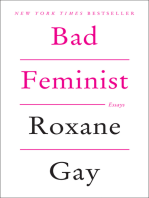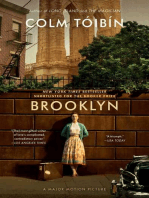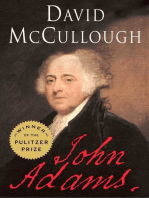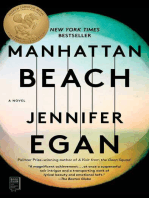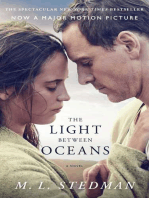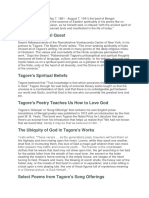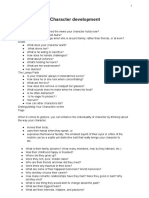0 ratings0% found this document useful (0 votes)
6 viewsEssay 1
Essay 1
Uploaded by
hằng Trinh122
Copyright:
© All Rights Reserved
Available Formats
Download as DOCX, PDF, TXT or read online from Scribd
Essay 1
Essay 1
Uploaded by
hằng Trinh0 ratings0% found this document useful (0 votes)
6 views10 pages122
Original Title
essay 1
Copyright
© © All Rights Reserved
Available Formats
DOCX, PDF, TXT or read online from Scribd
Share this document
Did you find this document useful?
Is this content inappropriate?
122
Copyright:
© All Rights Reserved
Available Formats
Download as DOCX, PDF, TXT or read online from Scribd
Download as docx, pdf, or txt
0 ratings0% found this document useful (0 votes)
6 views10 pagesEssay 1
Essay 1
Uploaded by
hằng Trinh122
Copyright:
© All Rights Reserved
Available Formats
Download as DOCX, PDF, TXT or read online from Scribd
Download as docx, pdf, or txt
You are on page 1of 10
She walks in Beauty
She walks in Beauty is a good examole of a Romantic poem . It
clearly illustrates some of the most important ideas of
Romanticism. Write a 250-300-word essay about how She
Walks in Beauty represents the ideals of Romanticism.
She Walks in Beauty is a poem about a beautiful
woman. It's much more than that, as well. It is
also a part of the literary movement known as
Romanticism. The poem embodies many of the
important ideas of Romanticism.
First of all, Romantic literature often
demonstrates a preoccupation with introspection,
mystery, and sadness. The woman in the poem is
not necessarily sad, but the speaker does imply
some kind of darker emotion by comparing the
woman's beauty to the night. The night is dark
and hidden, and is often connected with
melancholy. So by comparing the woman's
beauty to the night, the speaker implies that there
is some kind of sadness about her, though he
never comes right out and says it.
Romantic authors also loved the natural world.
They believed that it was the ultimate
representation of beauty and that people were
healthiest when they were in nature. The poem
upholds this idea, as well. The speaker compares
the woman's beauty to "nights/Of cloudless
climes and starry skies." In these lines, the
speaker connects the woman's beauty with nature,
which makes her even more attractive.
Finally, Romanticism emphasized the importance
of emotion. This is also obvious in the poem. The
speaker writes, "She walks in beauty like the
night." When he expresses this thought, it shows
that he felt compelled to write about the woman
the moment he saw her walking by him in the
darkness. Something about her elicited an
emotional response from him. The poem is a
product of the man's emotions.
In conclusion, I believe that She Walks in Beauty
is an excellent example of a Romantic poem. It
shows several important characteristics of the
movement.
Pride and Prejudice
In the passage from Pride and Prejudice, the reader
meets two different characters, Mr. Bingley and Mr.
Darcy. Although these men have some things in
common and are friends, they are also quite different.
Using your answers to the sections above, write a 250- to
300-word essay comparing and contrasting Mr. Darcy
and Mr. Bingley.
Mr. Bingley and Mr. Darcy are two important
characters from Pride and Prejudice. The two men are
friends and they are from the same social class. This,
however, is where the similarities end. Despite their
superficial resemblance to each other, the men are
quite different in terms of manners, attitude, and
temperament.
Mr. Bingley has great manners. He knows how to act
at a ball. The narrator reports that he "had soon made
himself acquainted with all the principal people in the
room" and "danced every dance." Obviously, Mr.
Bingley knows how to act in social situations. Mr.
Darcy, on the other hand, "declined being introduced
to any other lady," and only dances with two women -
both of whom he knows. Mr. Darcy, then, does not
have good manners. He does not return hospitality and
acts impolitely for no reason.
Mr. Bingley also has a much better attitude than Mr.
Darcy. He "was lively and unreserved," while Mr.
Darcy, "spent the rest of the evening in walking about
the room, speaking occasionally to one of his own
party." Mr. Bingley has a great time at the ball
because of his good attitude and general friendliness.
Mr. Darcy has a bad time, because he doesn't have a
good attitude.
Finally, Mr. Bingley has a much nicer temperament
than Mr. Darcy. Mr. Bingley has "easy, unaffected
manners," and is generally more pleasant than Mr.
Darcy. Mr. Darcy is "proud," "above his company,"
and "disagreeable." Not only is his attitude while at
the ball bad, but his overall personality is rude and
unpleasant for many people.
Mr. Darcy and Mr. Bingley are similar in many ways,
but their similarities are only superficial. Underneath
their wealth and social status, the two men are very
different, with Mr. Bingley being a much more polite,
outgoing, and pleasant person than Mr. Darcy.
Frankenstein
Victor Frankenstein is a modern Prometheus,
reminding us of the dangers of going against nature.
Write a 250- to 300-word essay about the importance
this theme has in the story of Frankenstein, and its
consequences.
In Frankenstein, Mary Shelley gives us a
terrifying retelling of the story of Prometheus.
She suggests that when humans try to overthrow
the natural order of things, there will be
devastating consequences.
This is very clear when the reader first encounters
Victor's creature. First of all, Shelley makes sure
to establish that what Victor has done does,
indeed, go against the natural order of things.
Victor says that he must "infuse a spark of being
into the lifeless thing that lay at my feet." The
way in which he phrases this makes it clear that
he is doing something very far outside the realm
of nature.
Once the creature comes to life, the horror begins.
Victor describes the creature as having a "dull
yellow eye," "yellow skin," "watery eyes," and a
"shrivelled complexion." All of these words give
the image of something unhealthy and, indeed,
quite frightening. Humans cannot reach the level
of perfection that nature does, and though Victor
chose the creatures features to be "beautiful," the
end result is grotesque.
Finally, we get to see Victor's reaction to the
creature. Despite being the creator of the monster,
he is still shocked by it. He says that "horror and
disgust filled my heart," when he saw it. And he is
"unable to endure the aspect of the being I had
created." Obviously, then, the creature evokes
very negative responses. This suggests, once
more, that people should not go against the
natural order of things and expect good results.
As Frankenstein is "the Modern Prometheus" of
the title, we know that such acts will not go
unpunished. Indeed, Victor loses everything he
loves, as the monster kills first his brother, then
his friend, and finally his wife, showing the
reader the clear consequences of going against
nature.
Wuthering Heights
Heathcliff and Edgar are two of the main characters in the
novel. Write a 250- to 300- word essay comparing and
contrasting the two men, and commenting on the
significance of their differences in light of the choice
Catherine is forced to make between them. When you can,
quote the passage directly.
The two main male characters in Wuthering
Heights are Heathcliff and Edgar Linton. The
difference between them represents the choice
Catherine must make between respectability and
passion.
Edgar and Heathcliff are very different, starting
with their appearances. Edgar has blond hair, blue
eyes, and light skin. Heathcliff, on the other hand,
has dark skin, eyes, and hair. Edgar resembles the
sunny, ordered parkland around Thrushcross
Grange, whereas Heathcliff represents the dark
moors and wild love. The difference in
appearance highlights Catherine's choice between
the familiar and the unfamiliar. In the end, the
familiar is what wins.
Edgar and Heathcliff also vary in terms of social
class. When Nelly talks of Edgar's family, she
refers to it as "wealthy and respectable." In
contrast, Catherine states that to marry Heathcliff
would "degrade" her. Here we see the very real
influence of society on these characters. In
choosing to marry Edgar, Catherine accepts the
status quo. She does not push the limits.
Finally, Edgar and Heathcliff are very different in
terms of their temperaments. Edgar is kind, but
weak. Heathcliff is strong, but cruel. Catherine
chooses to be with the man who is weak. Perhaps
this represents her own selfishness, as she knows
that she will be able to get what she wants. Again,
Catherine prefers the safe and easy option.
The differences between Heathcliff and Edgar
represent the major conflict in the novel,
Catherine Earnshaw's "man versus self" conflict.
She must choose between a conventional
marriage with Edgar, which will bring her status
and comfort, and the wild passionate love she has
for Heathcliff. By choosing the former, she shows
she values safety and security more than love.
The terrible consequences of her choice,
however, show us the danger of ignoring the
passionate side of our nature.
Hamlet
In the "To be or not to be" speech, Hamlet has a
conflict with himself. He tries to decide if he
should kill himself or not. He presents
arguments for both sides. Write a 250-to 300-
word essay explaining which argument you
think is stronger. Use quotations from the
speech to support your opinion.
In this speech from Hamlet, the title character
vacillates between two options. On the one
hand, there is death and the end of suffering.
On the other hand, there is life and
all of the indignities it brings. Hamlet has a
conversation with himself in which he presents
arguments for both sides. He ultimately chooses
life, but his reasoning for death seems stronger.
Hamlet compares death to sleep throughout the
passage. He says, for example, "To die, to
sleep." This connects the two ideas, and it
shows how Hamlet feels about death. When a
person is tired, all he wants to do is sleep.
Similarly, Hamlet is depressed. Death will bring
him relief in the same way that sleep brings
relief to the weary.
Similarly, Hamlet mentions that death would
end "the heart-ache and the thousand natural
shocks/That flesh is heir to." This means that
Hamlet believes all of his troubles and pain
would instantly vanish if he was no longer alive.
He even says that this is a
"consummation/Devoutly to be wish'd."
Obviously, he is in a lot of pain. It is clear that
death represents a real relief to him.
Finally, Hamlet questions why anyone would
continue suffering when "he himself might his
quietus make/With a bare bodkin?" Hamlet
knows what it takes to relieve his pain. He
knows a way out. His arguments for death are
compelling.
He does not, however, choose this option. And
in the end, it is fear that prevents him from
taking this option. He chooses to live because he
does not know "what dreams may come" in that
"sleep of death." In Hamlet's speech, then, we
see that though there is a stronger argument for
death, the emotional pull of fear is too great for
Hamlet to overcome.
You might also like
- The Subtle Art of Not Giving a F*ck: A Counterintuitive Approach to Living a Good LifeFrom EverandThe Subtle Art of Not Giving a F*ck: A Counterintuitive Approach to Living a Good LifeRating: 4 out of 5 stars4/5 (5945)
- The Gifts of Imperfection: Let Go of Who You Think You're Supposed to Be and Embrace Who You AreFrom EverandThe Gifts of Imperfection: Let Go of Who You Think You're Supposed to Be and Embrace Who You AreRating: 4 out of 5 stars4/5 (1109)
- Never Split the Difference: Negotiating As If Your Life Depended On ItFrom EverandNever Split the Difference: Negotiating As If Your Life Depended On ItRating: 4.5 out of 5 stars4.5/5 (888)
- Hidden Figures: The American Dream and the Untold Story of the Black Women Mathematicians Who Helped Win the Space RaceFrom EverandHidden Figures: The American Dream and the Untold Story of the Black Women Mathematicians Who Helped Win the Space RaceRating: 4 out of 5 stars4/5 (927)
- Grit: The Power of Passion and PerseveranceFrom EverandGrit: The Power of Passion and PerseveranceRating: 4 out of 5 stars4/5 (618)
- Shoe Dog: A Memoir by the Creator of NikeFrom EverandShoe Dog: A Memoir by the Creator of NikeRating: 4.5 out of 5 stars4.5/5 (545)
- The Hard Thing About Hard Things: Building a Business When There Are No Easy AnswersFrom EverandThe Hard Thing About Hard Things: Building a Business When There Are No Easy AnswersRating: 4.5 out of 5 stars4.5/5 (354)
- Elon Musk: Tesla, SpaceX, and the Quest for a Fantastic FutureFrom EverandElon Musk: Tesla, SpaceX, and the Quest for a Fantastic FutureRating: 4.5 out of 5 stars4.5/5 (476)
- Her Body and Other Parties: StoriesFrom EverandHer Body and Other Parties: StoriesRating: 4 out of 5 stars4/5 (831)
- The Emperor of All Maladies: A Biography of CancerFrom EverandThe Emperor of All Maladies: A Biography of CancerRating: 4.5 out of 5 stars4.5/5 (274)
- The Little Book of Hygge: Danish Secrets to Happy LivingFrom EverandThe Little Book of Hygge: Danish Secrets to Happy LivingRating: 3.5 out of 5 stars3.5/5 (419)
- The World Is Flat 3.0: A Brief History of the Twenty-first CenturyFrom EverandThe World Is Flat 3.0: A Brief History of the Twenty-first CenturyRating: 3.5 out of 5 stars3.5/5 (2272)
- The Yellow House: A Memoir (2019 National Book Award Winner)From EverandThe Yellow House: A Memoir (2019 National Book Award Winner)Rating: 4 out of 5 stars4/5 (99)
- Devil in the Grove: Thurgood Marshall, the Groveland Boys, and the Dawn of a New AmericaFrom EverandDevil in the Grove: Thurgood Marshall, the Groveland Boys, and the Dawn of a New AmericaRating: 4.5 out of 5 stars4.5/5 (270)
- The Sympathizer: A Novel (Pulitzer Prize for Fiction)From EverandThe Sympathizer: A Novel (Pulitzer Prize for Fiction)Rating: 4.5 out of 5 stars4.5/5 (122)
- Team of Rivals: The Political Genius of Abraham LincolnFrom EverandTeam of Rivals: The Political Genius of Abraham LincolnRating: 4.5 out of 5 stars4.5/5 (235)
- A Heartbreaking Work Of Staggering Genius: A Memoir Based on a True StoryFrom EverandA Heartbreaking Work Of Staggering Genius: A Memoir Based on a True StoryRating: 3.5 out of 5 stars3.5/5 (232)
- On Fire: The (Burning) Case for a Green New DealFrom EverandOn Fire: The (Burning) Case for a Green New DealRating: 4 out of 5 stars4/5 (75)
- The Unwinding: An Inner History of the New AmericaFrom EverandThe Unwinding: An Inner History of the New AmericaRating: 4 out of 5 stars4/5 (45)
- Mandrie Si Prejudecata Rezumat EnglishDocument2 pagesMandrie Si Prejudecata Rezumat EnglishSerban Arin100% (2)
- Pride and Prejudice ScriptDocument25 pagesPride and Prejudice ScriptLaura JaszczNo ratings yet
- 2 3 65 338 PDFDocument2 pages2 3 65 338 PDFPaula Vanessa Porras BagettNo ratings yet
- Appropriateness of The Title Pride and Prejudice by Jane AustenDocument11 pagesAppropriateness of The Title Pride and Prejudice by Jane AustenPANo ratings yet
- Modernism in English LiteratureDocument61 pagesModernism in English LiteratureDanear Jabbar AbdulkareemNo ratings yet
- Prejudice: Austen'S Use of Irony in Pride andDocument5 pagesPrejudice: Austen'S Use of Irony in Pride andSabnaj SarkarNo ratings yet
- Holiday Homework Session 2013-14 Class XIDocument5 pagesHoliday Homework Session 2013-14 Class XIRKS708No ratings yet
- Rabindranath TagoreDocument18 pagesRabindranath Tagorestella,engoziNo ratings yet
- Excerpt From Pride and Prejudice Jane Austen 2009Document10 pagesExcerpt From Pride and Prejudice Jane Austen 2009Jay-ey SantigNo ratings yet
- 10.my Dearest LizzyDocument1 page10.my Dearest LizzyRicha Mehta100% (1)
- Pride and PrejudiceDocument50 pagesPride and Prejudiceileana stoicaNo ratings yet
- Winter Holidays Ap Literature AssignmentDocument1 pageWinter Holidays Ap Literature Assignmentapi-261723412No ratings yet
- MEG 03 - June2010 June2023Document50 pagesMEG 03 - June2010 June2023Arvind KumarNo ratings yet
- SCP Jane Austen Answer-SheetDocument2 pagesSCP Jane Austen Answer-SheetNatividadOrdiñanaNo ratings yet
- Snowflakes at Pemberley A Pride and Prejudice Variation by Jennifer KayDocument142 pagesSnowflakes at Pemberley A Pride and Prejudice Variation by Jennifer KayBautista GentileNo ratings yet
- Pride - Prejudice ScriptDocument37 pagesPride - Prejudice Scriptomarelshimy00No ratings yet
- Pride and Prejudice Book ReportDocument8 pagesPride and Prejudice Book ReportKaty JaraNo ratings yet
- Element of Fiction in Pride and PrejudiceDocument35 pagesElement of Fiction in Pride and Prejudiceshazura_75No ratings yet
- Question No. 9: Answer The Following QuestionsDocument2 pagesQuestion No. 9: Answer The Following QuestionsAR MalikNo ratings yet
- Questions F R Dis Ussi N: Type AnswersDocument2 pagesQuestions F R Dis Ussi N: Type Answerstheoddone5192No ratings yet
- Romance Romance EssayDocument19 pagesRomance Romance EssayFrancelino LeandroNo ratings yet
- Pride and Prejudice Teaching TipsDocument4 pagesPride and Prejudice Teaching TipsSey BarcaNo ratings yet
- Analysis FeminismDocument9 pagesAnalysis FeminismCintaNo ratings yet
- International Baccaulaureate Extended Essay: Convocatory Number: 049365-0007Document7 pagesInternational Baccaulaureate Extended Essay: Convocatory Number: 049365-0007Arturo SialerNo ratings yet
- Developmental Exercise ReedsyDocument20 pagesDevelopmental Exercise ReedsySameeha M100% (1)
- What Is Fan-Fiction and Why Are People Saying Such Nice Things About It?Document25 pagesWhat Is Fan-Fiction and Why Are People Saying Such Nice Things About It?Steve Ruiz0% (1)
- MCQDocument15 pagesMCQRaheelaZahoorNo ratings yet
- Analysis Novel Pride and Prejudice by Jane Austen PrintDocument17 pagesAnalysis Novel Pride and Prejudice by Jane Austen PrintPipin ApriolaNo ratings yet
- CBSE Social Science X Solved Paper Exam 2018Document20 pagesCBSE Social Science X Solved Paper Exam 2018ARSHAD JAMILNo ratings yet
- Examen Parcial - Semana 4 INGLESDocument12 pagesExamen Parcial - Semana 4 INGLESClaudia MedinaNo ratings yet













